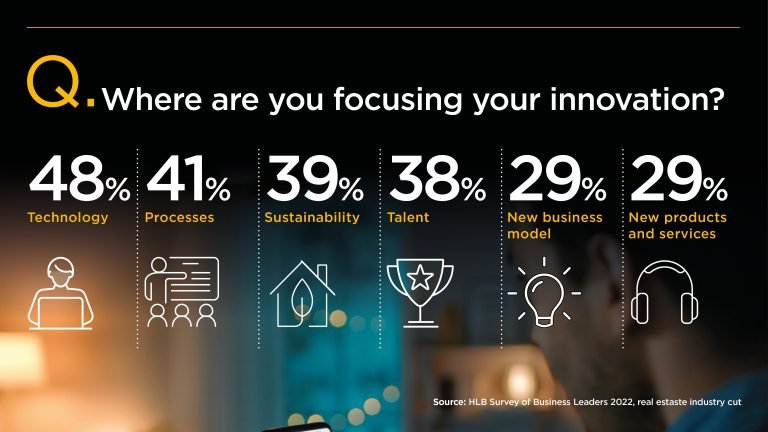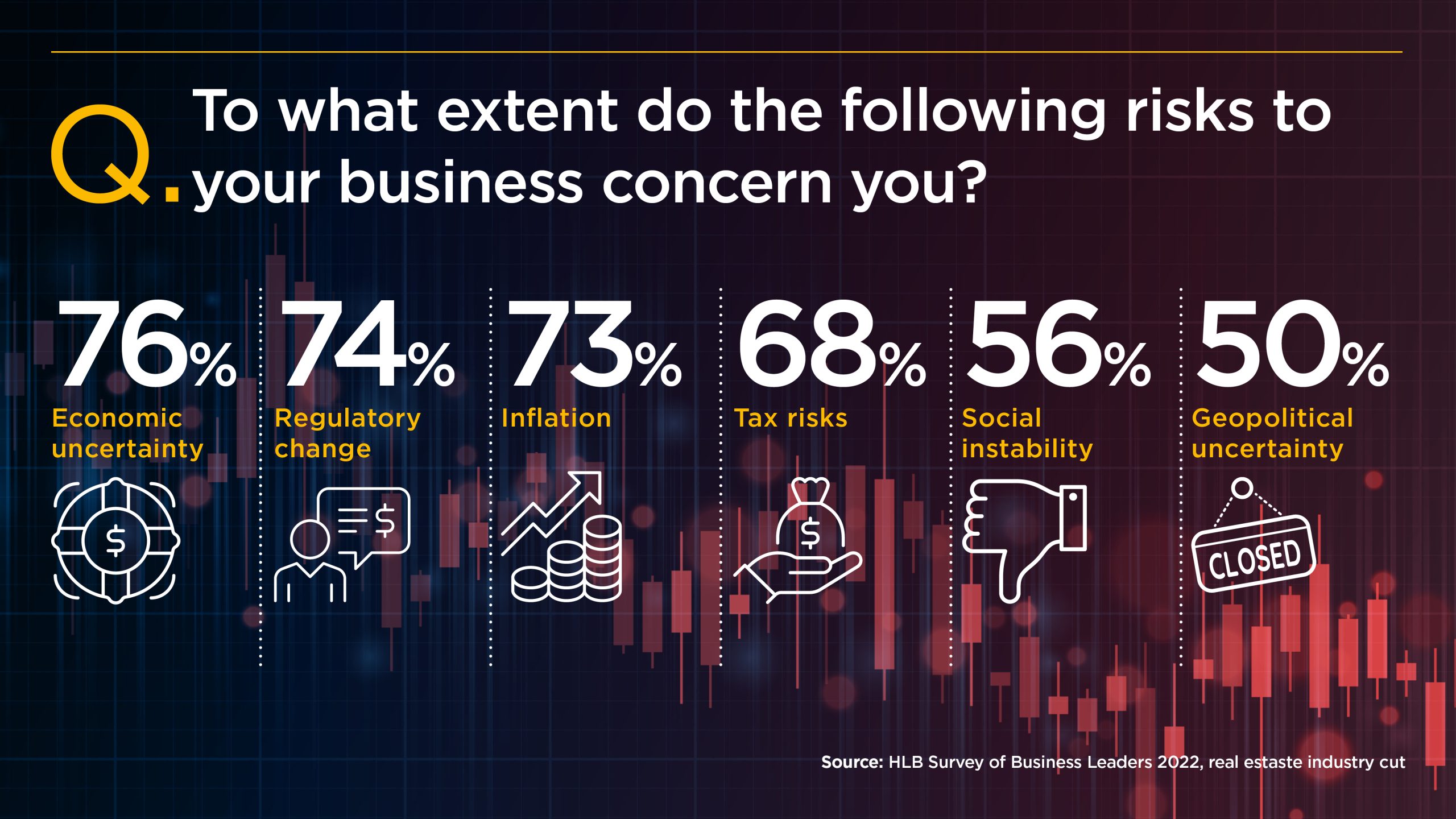Innovation is critical to future-proofing the real estate and construction sector

Key insights:
- 86% of real estate developers are more confident in their ability to innovate than pre-pandemic
- 95% cite rapid and effective innovation as critical to future growth
- 55% have a budget set aside to fund innovation
- 44% name access to emerging technologies as a key enabler for innovation
Over the past decade, technological innovation has been the key driver of transformation in the world's most successful industries, including banking, entertainment, transport, and e-commerce. An exploding population combined with the increasing adoption of digital products has led to a demand for faster, cheaper, and more efficient services.
This represents a dire need for innovative construction techniques. By reducing construction costs while also making buildings more eco-efficient, the industry benefits while contributing to positive societal transformation in other areas.
To gain insights into how the real estate and construction industry has emerged from the pandemic into a world more focused on sustainability, we reviewed data from our global HLB Survey of Business Leaders. The study gathered responses from some of the world's leading industry professionals about their plans for the coming year, covering growth strategies, sustainability goals, and perceived weaknesses.

Innovation encouraged by market disruption
There is a near-unanimous agreement (98%) amongst real estate and construction business leaders that more rapid and effective innovation is critical to future growth in the sector. The market disruption of the past two years has delivered some valuable lessons to the construction and real estate industry. However, despite the ongoing challenges, 89% of business leaders agree that market disruption motivates them to innovate more aggressively. A further 80% report a higher degree of confidence in their ability to innovate than before the pandemic
The three keys areas where industry leaders are now focusing their new-found passion for innovation include :
- New technology (48%)
- Improving processes (41%)
- Better sustainability (39%)
Unlocking growth and profitability
Confidence has begun to seep back into the business world as restrictions ease and the economy hints at a recovery. There is an increased focus on business models that highlight digital solutions and prioritize flexibility in the workplace. This entirely new working environment, introduced by the pandemic, has led to significant changes in the way businesses operate. To unlock growth and profitability, business leaders must be prepared to adopt unfamiliar practices and embrace these changes.
Despite a quarter of real estate and construction business leaders expecting global growth to decline further in 2022, confidence in their own business goals is on the rise. An impressive 61% believe they are more innovative than their industry peers while 79% are confident in their ability to grow the business in the next 12 months. At the far end of the scale, 21% say they are very confident in their own ability to grow the business in the next 12 months, up from only 12% last year.
So where do they expect growth and profitability to come from?
Today's most successful businesses have thrived on a combination of cost reduction and operation efficiency, typically achieved through automation, digitization, and sustainable practices. A key example is Tesla, which uses a winning combination of technological transformation and environmental credit sales to achieve an astonishingly successful business model.
Over half of real estate and construction leaders consider operational efficiency to be the greatest weakness in the business, with 67% aiming to improve in this area. A similarly high percentage (58%) put a strong focus on cost reduction as a means to improve growth and profitability. After cost reduction and operation efficiency, human capital investment (36%) and the adoption of new technologies (35%) are the second most important considerations for leaders in real estate and construction.
The following factors were highlighted as key components that aid innovation capacity:
- Bold leadership (38%)
- Access to technology (35%)
- Diversity of talent (29%)
- Customer feedback (29%)
Talent through diversity
If real estate and construction businesses hope to thrive in 2022, they'll need to adapt to changes in the workforce. In many cases this will translate to a reduction in staff, in others, it will present challenges in finding the right talent to develop new processes. Remote working has also given rise to a trend away from traditional employment and growth in freelancing, or the 'gig economy.’ Navigating this new landscape is a difficult but important part of transitioning to modern business practices that are critical to growth.
Environmental concerns combined with an increased focus on health and well-being add another new element to how an organization manages its staff. While remote workers can help to reduce an organization's carbon footprint, they present new challenges for health and safety.
Finding good talent has been identified as the second greatest challenge that business leaders need to overcome in 2022, with 41% citing the potential for improvement in this area. Greater diversification could be how organizations face this challenge, with 86% of business leaders agreeing that a more diverse workforce improves their ability to innovate
Technological innovation
Population growth, particularly that of the middle-class, is putting pressure on the market. Real estate and construction companies that service this industry should have a clear understanding of how new technologies can integrate into project development and property valuations to increase efficiency and lower cost.
Several other technological developments are helping to drive innovation in a post-pandemic world, such as cloud-based services, blockchain, and artificial intelligence (AI). Many of these provide similar benefits to any business, such as AI-assisted customer support and low-cost cloud storage, but some have specific benefits to the real estate and construction industry.
Business leaders in real estate and construction placed the highest investment value on the following innovations in technology:
- Cloud services (48%)
- Internet of Things (IoT) (36%)
- Human augmentation (33%)
IoT shows particular promise in helping to connect the increasingly digitized machines and devices used in the modern construction industry. Although blockchain technology was not recognized in the top three, several companies around the world are already using it to add transparency and automation to their supply chain system. Still a nascent technology, it shows great promise in areas of payment processing, identity authentication, supply chain monitoring, and raw material origin tracing.
Sustainable and renewable practices
The use of renewable energy and sustainable practices is a consideration that will shape the future of modern businesses across the globe. In the real estate and construction industry, the implementation of renewable on-site energy is likely to become a standard feature of future projects. Buildings account for a significant amount of global greenhouse gas emissions and approximately half of the world’s energy consumption, so modern buildings must be not only functional and affordable but also sustainable.
Governments around the world are increasingly providing favourable funding for projects that focus on the use of renewable energy and aid in tackling climate change. Sustainability has now become so important to customers that there is a clear correlation between a building's rental value and its energy performance rating. Not surprisingly, the use of renewable energy tops the list of most important non-digital technologies for future growth, with 73% of business leaders citing it as their most critical concern in this area.

A complex risk landscape
As fear around the pandemic subsides, confidence in the global economy has more than doubled, reaching 48% this year compared to only 22% last year. However, with the war in Ukraine ongoing, these figures may change as the year progresses. Real estate and construction business leaders remain cautious, aware that a complex risk landscape is still in play with several concerns that require close attention.
Tying in with general economic unease, the looming spectre of inflation is noted as the second most concerning factor in the real estate and construction industry. Almost three-quarters of business leaders worry about how inflation could affect wages, material costs, and delivery times. The thousands of unfinished buildings abandoned after the 2008 financial crash continue to provide a stark reminder of how economic and inflationary pressures can derail construction projects.
But the economy is not the only notable macro factor that concerns real estate and construction professionals. Regulatory changes like the UK's Building Safety Bill are becoming increasingly stringent around the world and bring with them a host of additional costs and obligations.
Finishing off the top five concerns that keep industry leaders up at night are:
- regulatory change at 74%
- tax risk with 68%
- and social instability at 56%
Tying in with social instability, fears regarding geopolitical uncertainty (50%) and international trade flow disruption (45%) remain high and are unlikely to abate while the war in Ukraine wages on. Navigating this complex mix of risks in the macro environment may prove the greatest challenge for real estate leaders in 2022.
Fears and risks aside, 89% of real estate and construction leaders seem to agree on one thing: the challenges presented by two years of market disruption have motivated them to innovate even further. Having survived this far has provided them with fresh confidence and determination to overcome any new challenges that come their way. Business leaders who are prepared to pivot and reinvent business models when new market disruptions occur will be well placed to thrive over the next few years.
Success through innovation
The adoption of innovative technologies and modern business practices will be the key factors that define success for real estate and construction businesses going forward. However, keeping track of these changes and knowing how to integrate them into your existing business model can be a challenge.
About our research
Findings in this article are based on 66 survey responses from real estate and construction business leaders collected in quarter 4 of 2021, as part of HLB’s Survey of Business Leaders 2022. The majority of businesses surveyed are privately or family owned. For the full research report see HLB’s Survey of Business Leaders 2022: Powering your innovation engine.



